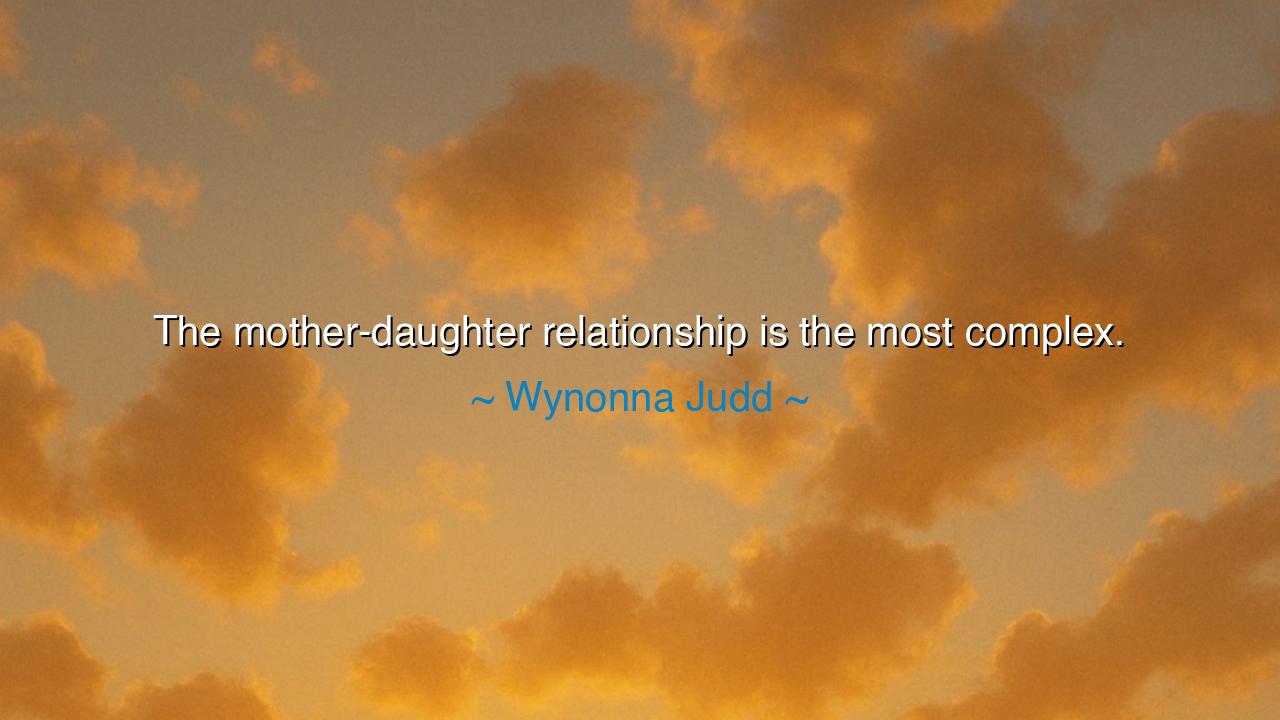
The mother-daughter relationship is the most complex.






The words of Wynonna Judd, “The mother-daughter relationship is the most complex,” echo with the timeless truth of human bonds. For from the beginning, the mother is the first face the child beholds, the first voice heard even within the hidden chambers of the womb. Between mother and daughter flows a river of love, duty, expectation, and reflection, so interwoven that neither can wholly be understood apart from the other.
This relationship is called the most complex, for it carries both tenderness and tension. The daughter is born from the body of the mother, yet she must one day become her own self, stepping forth with freedom. In this passage, love may tangle with rivalry, guidance with resistance, and admiration with the shadow of misunderstanding. Thus it is not a bond of simple affection, but of constant transformation.
The ancients knew that between parent and child lies both blessing and burden. But with the mother-daughter relationship, the mirror is closer, the likeness stronger, and so the weight of expectation grows heavier. The daughter sees herself in her mother, and the mother sees her own youth reborn in her daughter — and in this reflection there is both joy and struggle.
So Judd speaks what many have felt yet few have named: that this bond is both the fiercest sanctuary and the sharpest trial. To future generations, let it be known — the mother-daughter relationship is a crucible where identity is forged, where love is tested, and where, through the fire of complexity, a bond eternal is made.






A9Nguyen Tran My Anh 9A
I agree with Wynonna Judd’s perspective on the complexity of the mother-daughter relationship. It's filled with both love and moments of tension, as both women navigate their roles and expectations. How much of the complexity comes from the natural progression of independence in daughters, while mothers try to maintain their roles as caregivers? What can we do to ensure that this relationship evolves into something positive despite the inherent challenges?
CTNguyen Tran Cat Tuong
Wynonna Judd’s statement about the mother-daughter relationship feels very accurate, especially when considering the intensity and emotional weight it carries. Do you think this relationship is more complex than others because of the unique nature of how mothers and daughters mirror each other, both in physical and emotional traits? How do factors like culture and upbringing impact the complexity of this bond, and what can we learn from these dynamics in other relationships?
THNguyen Thu Hien
There’s truth in what Wynonna Judd says about the complexity of the mother-daughter bond. The relationship can be filled with love, admiration, tension, and even rivalry. How much of this complexity is tied to the different expectations and roles that mothers and daughters assume throughout life? Do you think this dynamic changes when daughters become mothers themselves, or is it something that remains constant as both generations evolve?
LNDu Linh Nhi
Wynonna Judd’s comment about the mother-daughter relationship makes me reflect on how multifaceted it really is. Mothers are often our first role models, yet as daughters grow, they begin to create their own paths, sometimes conflicting with their mother’s views. What do you think makes this relationship so complex—emotional dependence, societal expectations, or the power dynamics that shift over time? How do mothers and daughters navigate these challenges to maintain a healthy bond?
HCHuyenn Changg
I totally agree with Wynonna Judd that the mother-daughter relationship is often the most complicated. It’s one of the few relationships that’s both nurturing and challenging at the same time. Do you think this complexity comes from the expectations mothers place on their daughters and the way daughters strive to define their own identity, separate from their mothers? How does this relationship evolve as we age and gain more independence from our parents?